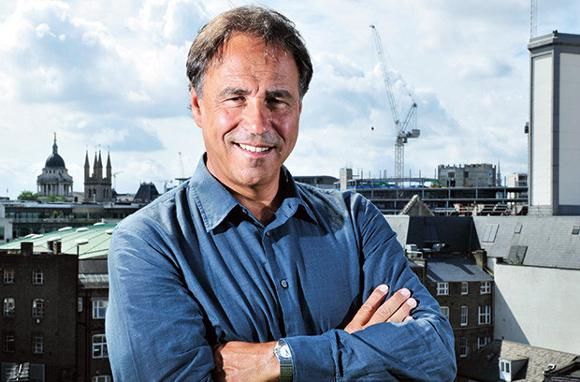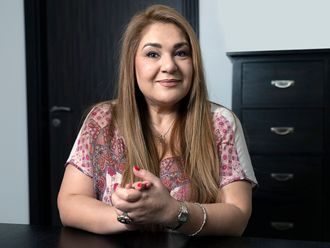
We’re in the midst of a telephone interview – Anthony is at his home in London – when I hear the faint sound of a doorbell.
There’s a long pause. Then the bell rings again.
A few seconds of total silence, then Anthony’s sonorous and plummy voice is a little subdued as he says: ‘Excuse me, I have to answer this, there’s someone at the door.’
A long pause again. I can hear papers rustling, a chair being pushed back… Then a loud voice: ‘Yes, who’s there?’ An inaudible reply. Suddenly Anthony’s voice booms, ‘Bring it up, I’m opening the door for you!’
A few silent seconds tick by, then he returns to the phone: ‘It’s OK, it was somebody delivering a parcel, let’s continue.’
The adrenaline that had shot up simmers down.
I have just been given a lesson in how to inject suspense into a perfectly ordinary daily occurrence by the bestselling mystery author. Clearly, he’d been expecting a delivery, but that did not stop him from playing a trick on me and giving me an uneasy two minutes. Little wonder then that the Sir Arthur Conan Doyle and Ian Fleming estates approached the 61-year-old author to write books featuring two of the most iconic heroes in literary fiction – Sherlock Holmes and James Bond.
And not only did Anthony step into the legendary writers’ shoes, but he also filled them quite nicely, thank you. His Holmes’ novels – Moriarty and The House of Silk – and James Bond novel Trigger Mortis were critical and commercial bestsellers.
Nevertheless, Anthony is best known as the creator of the teenage spy Alex Rider – 10 novels, all bestsellers.
Does that irk him a little bit?
‘Why should it?’ he counters. ’At the end of the day, what matters is the story. The story is the river that runs through all my work. I try not to see any difference between writing for children and writing for adults. I just go with the story. Of course, the marketing, the packaging and some of the content is different – but the actual act of writing, the physicality, is the same. What matters is whether it works or not. Ergo, I am glad the Alex Rider series works so well.’
Anthony should know a bit about that. ‘I was 9 when I knew I wanted to be a writer,’ he says. And like most Anthony Horowitz novels, there is a prologue.
‘I was put in an unpleasant boarding school in North London where I was very unhappy. It was depressing,’ he says. ‘To combat that I began telling stories in the dormitories at night – we slept nine or 10 to a room.’ He soon discovered that he had a natural gift for telling stories. ‘From that to writing stories was a very small step. At 10, I had already written my first play. Then I used to have a big notebook that I always carried around and was always writing in.’ He hoped he would have a published work before he turned a teen. ‘But I was first published in 1979 when I was 24. It was a children’s book called Enter Frederick K. Bower.’ Though not up to Anthony’s exacting standards, it was a modest success. ‘It was optioned by Disney, and almost made into a film! But in the days before JK Rowling, children’s books were very much the Cinderella of the industry. There was not a lot of attention paid to new writers and it was very difficult to break through. I had to write 15 books before I came up with Alex Rider to become the bestselling author I wanted to be.’
He has three tips for wannabe writers. ‘My first piece of advice is – read. The more you read the better you write.
‘Second, enjoy life – get out, have adventures, experience life. You need something to write about.
‘Third, enjoy your writing, if you don’t enjoy doing it, something’s wrong. Most importantly, not only for writers but also for all young people, whatever they aim to be doing; believe in yourself. If you believe in yourself and have complete faith, it will happen in the end.’
Simple enough, but what about rules?
‘There are no rules in writing,’ he says. ‘It helps of course to write about something you know. But every writer approaches life and their work in a different way. I don’t believe in rules, but I’ve always found that it’s easier to write about what you know, to write from experience, to write with real authority. If you are a young writer it is always advisable to write about what you feel comfortable with.’
A pause. Then his voice rumbles over the line: ‘Only one rule: Never put your teachers in your work, at least real people!’
He debunks another rule – that writers write for themselves first, and hope that it pleases the reader. ‘It’s not as cut and dry as that,’ he says. ‘I am writing for a readership first, although I never think too much about who those readers are. If you write a book and bury it in the garden it is dead. If it is read by one person it flickers, if it is read by a hundred people a flame begins to burn. If it’s read by a million people, then it’s exciting.’
And that’s what Anthony is after. ‘I write popular fiction for a large audience,’ he declares. ‘But it would be impossible to write those books if I wasn’t a member of that audience myself.
‘My books do begin with myself, with my own ideas and enthusiasm. But I am never forgetting that there is a large audience out there who read it.’
But Alex Rider was a departure from what he’d done until then. ‘My earlier books were much more autobiographical – they were about me, my life, my family and my world. I dropped all that when I wrote Alex Rider; it was something I knew nothing about – spies, and fantasy and MI5, this boy who was nothing like me at all. I think that was what prompted its success.’
But Anthony is known for more than just the Alex Rider series. Apart from penning a horror series, The Power of Five, the Diamond Brothers series for kids, and 26 other books, he has also scripted three films including Stormbreaker and The Gathering, 11 television series including the hugely successful Foyle’s War, which was produced by his wife, Jill Green, and a play, Mindgame which starred Keith Carradine and was directed by Ken Russell.
How does he keep pace, writing across so many genres?
‘Writing is an adventure,’ he says. ‘For me, the love of writing is to explore that extraordinary landscape that the craft offers. In every book I write I want to challenge myself, do something new.’
Even as a story pops into his head, Anthony knows what it will turn out to be. ‘From the outset, I’m clear which envelope I’m going to put an idea in – a short story, a novel or a play or a television series,’ he says. So what made him stop writing the immensely successful Alex Rider series and go down the Sherlock Holmes/James Bond path?
‘I wrote the Holmes and Bond books because I was asked to,’ he says. ‘I have nothing against writing sequels if it’s a challenge. I’d read Sherlock Holmes since I was 17 and loved the books and I thought I could do a good job of revisiting his world. How could I resist the invitation to spend a couple of years of my life at 221B Baker Street in the company of two of the greatest characters in English fiction? I couldn’t say no.’
‘Normally I begin with a blank sheet of paper. Here, I was given the extraordinary gift of writing about these wonderful incredibly well-defined characters.’ Anthony Horowitz has no illusions that his James Bond book will be made into a film. ‘The books and films are two separate entities, managed by different companies,’ he says. ‘Trigger Mortis is meant to be a 1950s-style novel, the kind of book Ian Fleming might have written himself. It is not meant to be a Daniel Craig film. I love his films, but this just wasn’t meant to be one.’
Anthony admits that he prefers writing thrillers ‘because the genre fascinates me.
‘I like excitement, I like surprises, I like magic, I like fooling the audience. I just finished a novel called The Magpie Murders, which I spoke about at the Emirates Literature Festival [in Dubai last month]. It is a massive puzzle for readers and questions the whole nature of thrillers and how they are written and constructed. I love fooling people!’
What, then, is the anatomy of a thriller?
‘There is no single answer to that question,’ he says. ‘For me, the sort of thriller that I enjoy is a fast-flowing river in which the hero and the reader are both swimming for their lives. That’s how I see it. You plunge into this torrent and there are boulders and sharp turns and ever-threatening dangers and you keep flailing along in the hope of surviving.’
Not surprisingly, thrillers are among Anthony’s favourite reads: ‘I recently read Lionel Davidson’s Kolymsky Heights, which I think is a near-perfect thriller,’ he says. ‘My favourite author though is Charles Dickens. His Great Expectations has elements of a thriller. There are many things that are great about his books – his language, his characters, his view of the world, but what I admire about his writing is his narrative content, his marvellous characters, all travelling in a straight line, moving forward relentlessly, and there’s always a surprise lurking around the corner.’ So why is it that most successful mystery writers are British?
Anthony laughs. ‘My new book The Magpie Murders is all about that. I discuss where detective stories come from, why we read them, why there are so many, why the British do it so well…
‘But one of the reasons is that we are very adept at hiding our emotions, we are not very forthcoming people, we don’t have the Mediterranean passion, the American frankness of wearing your heart on your sleeve. We are quite buttoned up, we hide behind our lace curtains, we keep secrets. A detective story is all about the exact opposite, it’s all about finding secrets, tearing down the curtains. It is something that works particularly well in British hands – we have such experience of keeping secrets!’
Though Anthony does not work on more than one book at a time, he does juggle various projects simultaneously. ‘At the moment I have two TV serials I am working on, I am doing the final polishing on The Magpie Murders, and I am already thinking of my next play,’ he says. ‘I generally tend to have three or four projects going on in my head at any time.’
Two projects Anthony is very excited about are New Blood, a new television show for the BBC, which is being edited at the moment - and Collision for American television. The first is a crime drama, while Collision ‘is a remake of the show I made in England some years ago about a road accident.’
So what working process does he follow?
‘I spend many hours writing, and every minute spent at my desk is an adventure. I don’t keep regular hours. Why would I? I work all the time. If I find it difficult to write, I go for a walk, or go to the cinema or art gallery or watch television or read. When I am writing I am immersed and I might spend 10 hours straight at it.
‘But I also wouldn’t want to give you the impression that I am some kind of slave to my desk. I have a varied, rich and happy life. I am very fortunate to have arrived where I am.’












